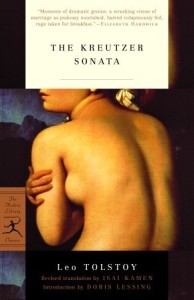Article first published asBook Review:The Kreutzer Sonataby Leo Tolstoyon Blogcritics.
About:
The Krautzer Sonata by Leo Tolstoy is a novella written in 1889. At times this novella seemed like a rant that goes on page after page, but taken as a whole I can certainly see the genius behind it.
- 128 pages
- Publisher:Modern Library
- Language:English
- ISBN-10:0812968239
Buy book inpaperorelectronicformat*
Thoughts:
I enjoyed The Krautzer Sonata by Leo Tolstoy very much, it was a quick read, quite interesting but also a bit disturbing. I disagree with many of the themes the book represents and it seemed as if Tolstoy wrote this novella while being in an extremely foul mood, or extremely mad at his wife.
The novella is pro-religion (Christianity), sexist, anti physical contact (sex), pro-life (or more accurately anti-birth control), and seems to justify murder. One of the characters (very few) feels justified at murdering his wife how might, MIGHT, have cheated on him. That being said, the book is very well written and can be appreciated even though one might disagree with almost all the opinions in the
I guess the major disagreement I have with Mr. Tolstoy is that sex is evil and that women are oppressed and have sex because men force them to. Men, on the other hand, are wired to have sex all the time (OK, I can’t argue with that) but will do best to avoid such temptations.
The story is poignant and, despite the themes above, presents the challenges of being married quite well. Tolstoy does well by making a point about the illusions of love and marriage, something which our high divorce rate might point to. As I mentioned, I don’t agree with many of the ideas presented in the story, but I do think that they are presented well, make some good points and are certainly a food for thought especially for those of us who hold contrary views.
Tolstoy could be the anti- Aesop, while Aesop used animals instead of humans in fables, Tolstoy gives people beastly traits. I understand why Tolstoy made that choice but simply didn’t care for the forced analogies (especially since there are so many good ones which can be observed almost daily).
There are no characters in this short story which I could see myself in, like or even sympathize with. The main character, Pozdnyshev, seems irrational at best and just plain nuts at worst; he seems to relish describing things in an appalling way in order to shock his audience.
Regardless, Tolstoy managed to write a powerful story in a short amount of space. That is a good thing because I don’t know if I would have been able to read a full length novel with the characteristics mentioned in previous paragraphs.
Synopsis:
Pozdnyshev overhears a conversation on a train about love and marriage when he is reminded of his past misdeeds. Pozdnyshev continues to talk to himself/G-d/the reader about how he fell in love, then out of love and finally murdering his own wife.
Buy book inpaperorelectronicformat*
Zohar — Man of la Book
Disclaimer: I got this book for free
*Amazon links point to an affiliate account


3 Comments
I haven’t read this story by Tolstoy, but I know I love Tolstoy. I’ll have to read it for myself and see what I get out of it. Thanks for bringing the story to my attention.
I hadn’t heard of this Tolstoy work before. One thing that annoyed me about War and Peace was his capacity to go on and on in his preachy-ness.
Yes, Tolstoy’s rants in War & Peace can be overbearing, but I found them interesting as well.